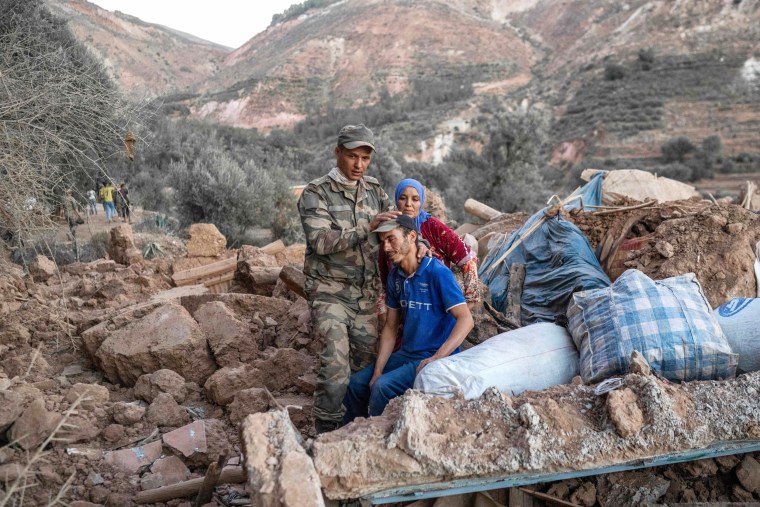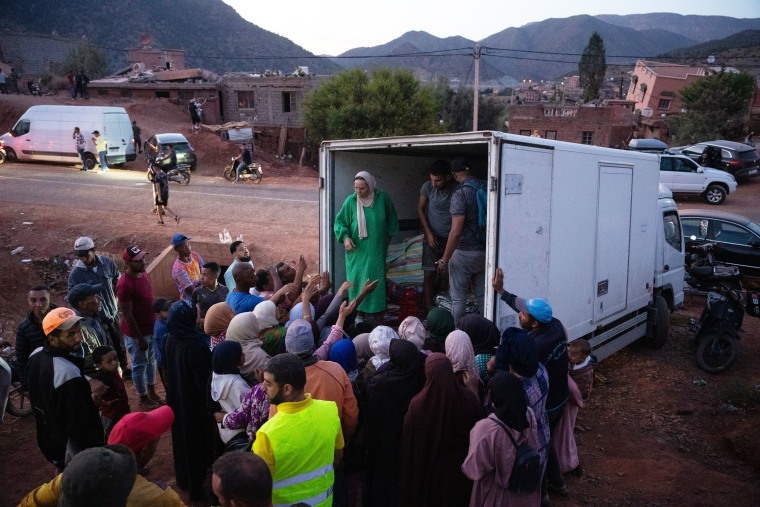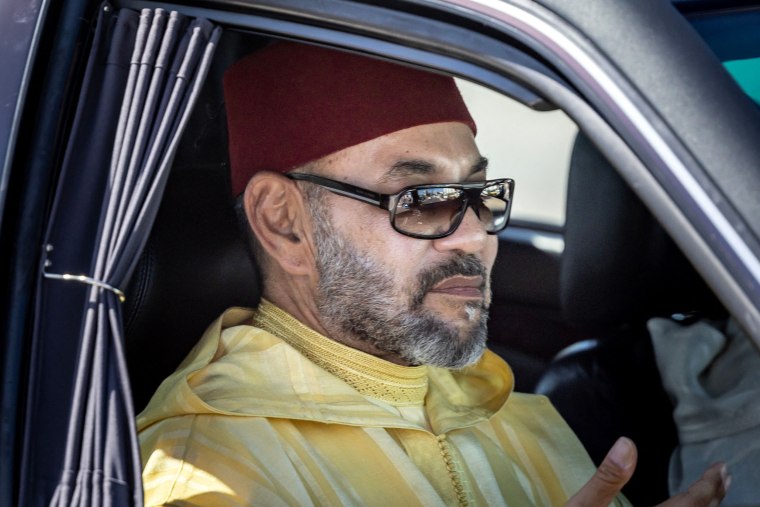TAFEGHAGHTE, Morocco — Three days after an earthquake leveled his village, Abdul Karim said he was still waiting for the government to come and help his devastated community.
“We’re not asking for much — not villas, just small homes,” he said, adding that regular Moroccans had been bringing food to this area about an hour’s drive south of Marrakech but that he and his fellow villagers have seen little official help. “Hundreds of people have had their homes damaged. They’re without shelter.”
“They are waiting for the government to do something,” he said.
Three miles north, in the town of Amizmiz, long lines of people waited Tuesday in the baking morning sun for aid handouts from troops. Some expressed frustration about the amount of aid that has been provided, with military officers doing their best to calm the crowds.
They aren’t alone in criticizing the Moroccan government for being slow to help after the powerful quake struck Friday, killing at least 2,800 people. Some residents have complained the rescue crews didn’t show up for days, leaving families to dig through the rubble themselves by hand.

The government and King Mohammed VI have been unusually quiet for a country reeling from a natural disaster, having released only a few short statements. And while officials from some countries, such as the United Kingdom, have praised the relief effort, some experts have questioned Morocco’s apparent reluctance to accept help from other countries, raising the question of whether choosiness is motivated by geopolitics.
Secretary of State Antony Blinken said the U.S. is ready to help “in any way that we can,” but he said in an interview Sunday with ABC News that he was still “waiting to hear from the Moroccan government” about whether help was needed or wanted.
France, Morocco’s ruler from 1912 to 1956, has been told its help wasn’t required, a spokesperson for the French foreign ministry, Anne-Claire Legendre, told French radio Sunday.
“Moroccan authorities know exactly what can be delivered,” French President Emmanuel Macron said Sunday at the Group of 20 summit in New Delhi. “We are at their disposal.”
French officials have sought to downplay the suggestion that it boils down to Morocco’s frosty relationship with its former rulers in Paris. But Morocco itself made no attempt to downplay the idea that its acceptance of aid has been politically selective, with its Interior Ministry saying Sunday that, for the time being, it was taking in search teams only from four “friendly countries”: Spain, the U.K., Qatar and the United Arab Emirates. If needed, the statement added, it would accept aid from other “friendly” countries.

Morocco’s foreign minister hasn’t responded to a request for comment about why it hadn’t accepted offers of help from other countries.
Morocco has been picky about donor countries because of “a mixture of pride and incompetence,” said Lise Storm, a professor specializing in North African politics at England’s University of Exeter. “It might sound a bit harsh saying that about the Moroccan government at this time — but it’s true.”
She and other analysts aren’t surprised the country refused aid from France — “you don’t want aid from the former colonial power” — and the U.S. is often treated with trepidation because it “is always seen as a meddler” by Morocco and others in the region, she said.
Domestically, Morocco does hold democratic elections, but the king retains “full dominance” of the country’s political institutions and can disband the legislature or dismiss Cabinet members.
The disaster response reinforces the idea that the government doesn’t care about the impoverished mountain communities rocked by the quake, Storm added, instead favoring wealthier metropolitan populations and foreign tourists.

As usual with such disasters, aid agencies are a key part of the picture. The International Federation of Red Cross and Red Crescent Societies has released 1 million Swiss francs ($1.1 million) to help with the effort. Such independent agencies have to maintain relationships with their host countries and usually don't comment.
When asked about the ongoing response in Morocco, and how it may compare to other countries' in similar situations, Todd Bernhardt, a spokesperson for the International Medical Corps, said in an email: “As a non-partisan, neutral humanitarian aid organization, we never comment on questions that cover geopolitics, national politics or policy.”
Local news is awash with stories from Spanish rescue teams impressed by the professionalism of their Moroccan counterparts. And so far things have gone smoothly, said Rob Norman, a command support officer with the U.K. International Search and Rescue Team, which responds to international disasters on behalf of the British Foreign Office.
“The initial challenge in every sort of disaster situation, initially, is getting into the country, which thankfully, due to the brilliant relationships between the U.K. government and Moroccan government, we were able to do very swiftly,” he said. “We’ve established this base of operations, we’ve deployed teams out into the field yesterday, which I think is a demonstration of how swiftly that whole process has been managed.”
For people like Zahra Ait Abdalah, 50, whose home in the neighborhood of Douar Dlam, a suburb of Marrakech, was destroyed, help can’t come soon enough.
“We have nothing, because all of our belongings — our money, clothes, everything — were inside,” said Abdalah, who is seeking shelter in a tent with her husband and five children.
“The roof fell on my head, and I was injured,” she added. Now “I have nothing to wear. And I have nothing to eat.”
Matt Bradley, Raf Sanchez, Susan Archer and Bill O’Reilly reported from Morocco and Alexander Smith from London. Charlene Gubash contributed from Morocco.

